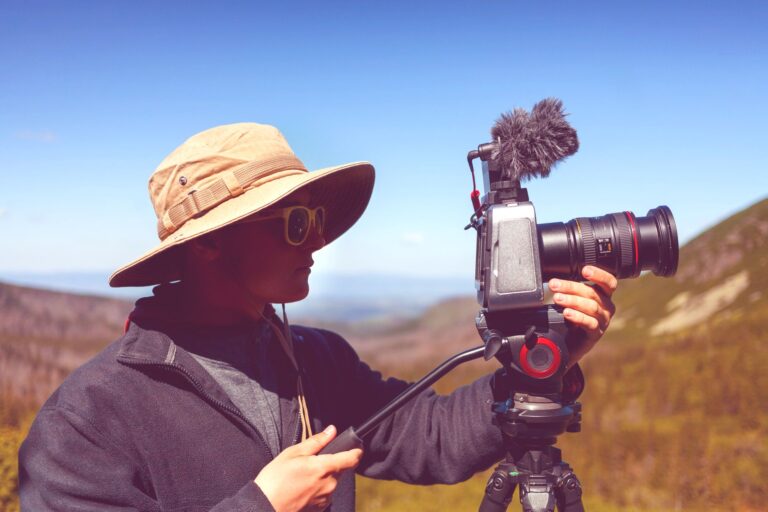Video cameras are now omnipresent in the modern world, from smartphones to professional-grade equipment used in various industries. It’s hard to imagine a world without video cameras, as they have revolutionized the way we document our lives and communicate with each other.
However, Have inventors ever wondered when they invented the first video camera? In this blog post, we will describe the history of video cameras, discussing the invention of the first video camera and how it has become a necessary part of our lives today. So, let’s journey back in time and discover the fascinating story of video cameras.
Table of Contents
The Invention of the Video Camera :
Cameras have a history dating back to the 17th century, with the invention of the camera obscura, a device that projected an image onto a surface for drawing. Since then, cameras have undergone significant advancements, leading to the invention of video cameras. The first video camera was developed in the 1950s by Ampex Corporation, an American electronics company. The device was named the Ampex VRX-1000 and used reel-to-reel tape to record and playback video. Its design and functionality were groundbreaking at the time, and it paved the way for the development of modern video cameras.
The invention of video cameras has significantly impacted various industries, including film and television. It has revolutionized how we capture and consume visual content, and its use in these industries has enabled us to experience a new level of entertainment and storytelling. Video cameras have become integral to our daily lives, from live events to pre-recorded shows and movies.
Evolution of Video Cameras :

Since the invention of the video camera in the 1950s, the technology has undergone significant advancements. The introduction of digital video cameras in the 1980s marked a turning point in the industry. Digital cameras allowed for higher-resolution video and better color representation, providing filmmakers and other professionals with new creative opportunities. The development of various video camera types, such as handheld and professional-grade cameras, has also contributed to the evolution of video cameras. Handheld cameras have become famous for their ease of use, portability, and affordability. In contrast, professional-grade cameras offer advanced features such as interchangeable lenses, high-speed frame rates, and advanced color grading capabilities.
As technology advances, we expect to see further developments in video cameras, including the incorporation of artificial intelligence and virtual reality technologies, opening up new possibilities for creative expression.
Impact of Video Cameras on Society :
Video cameras have significantly impacted society, which will never overdrawn. Video cameras have revolutionized how we document events and share information, enabling us to capture and preserve moments we would otherwise lose to time. In the field of journalism, video cameras have become essential tools for covering breaking news stories and providing visual evidence to support reporting. In sports, video cameras have enabled coaches and athletes to analyze performance and identify areas for improvement. In the entertainment industry, video cameras have created new forms of media, such as online videos and streaming content.
However, using video cameras raises ethical considerations, such as privacy concerns and surveillance. As technology continues to evolve, it’s important to consider video cameras’ impact on society and use them responsibly and ethically.

Future of Video Cameras :
The future of video cameras looks bright, with appearing technologies such as virtual and extended reality balanced to impact the industry significantly. We can expect video cameras to continue evolving, with resolution, frame rate, and color representation advancements. These advancements in film and television could enable new forms of storytelling and creative expression.
However, with these advancements come potential drawbacks and ethical considerations. For example, as video cameras become more advanced, concerns about their impact on privacy and surveillance may arise. Additionally, emerging technologies such as deep fakes, which use artificial intelligence to create realistic but fake videos, raise concerns about the authenticity of video content. As technology continues to evolve, it’s essential to consider the potential impact on society and to use video cameras responsibly and ethically.
Conclusion
In conclusion, the invention of the video camera in the 1950s revolutionized how we capture and consume visual content. Since then, video cameras have undergone significant advancements, leading to the development of various camera types, including handheld and professional-grade cameras. The impact of video cameras on society and various industries, such as film, television, sports, and journalism, has been immense. We can expect to see continued evolution in the future. Today, video cameras remain essential for documenting events, sharing information, and creating art. Considering the ongoing importance of video cameras, it’s worth asking ourselves, where would we be without them? How would our world be different? What new possibilities will the future of video cameras bring? These are important questions to ponder as we navigate the ever-changing landscape of technology and media.

Frequently Asked Questions
Answer: The first video camera was invented in the 1950s by the American electronics company Ampex Corporation.
Answer: The invention of video cameras has significantly impacted society, allowing us to capture and document events in real-time. It has enabled us to share information more quickly and accurately and has changed how we consume news, entertainment, and other forms of media.
Answer: Video camera technology has come a long way since the invention of the first video camera. Advances in digital technology have led to higher resolution, improved color representation, and more advanced features such as autofocus and image stabilization. Handheld cameras have become more compact and affordable, while professional-grade cameras offer advanced features such as interchangeable lenses, high-speed frame rates, and advanced color grading capabilities.
Answer: Video cameras have had a profound impact on various industries, including film, television, sports, and journalism. In these industries, video cameras capture and share information, analyze performance, and create new media forms. They have revolutionized how we experience and consume visual content and opened up new creative possibilities.
Answer: Yes, there are ethical considerations surrounding the use of video cameras, such as privacy concerns and surveillance. It’s important to use video cameras responsibly and ethically and consider their potential impact on society when using them. As technology continues to evolve, it’s essential to stay informed and aware of the potential drawbacks and ethical considerations that may arise.






